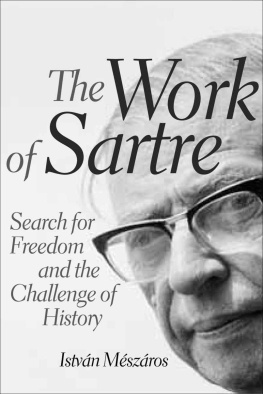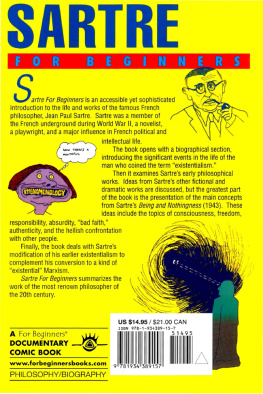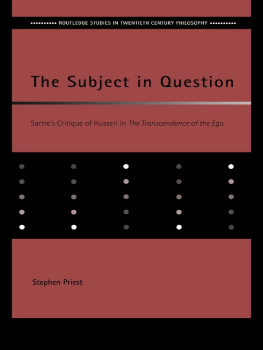THE WORK OF SARTRE
BY THE SAME AUTHOR
Satire and Reality, Szpirodalmi Knyvkiad, Budapest 1955
La rivolta degli intellettuali in Ungheria, Einaudi 1958
Attila Jzsef elartemoderna, Lerici 1964
Marxs Theory of Alienation, Merlin Press 1970
The Necessity of Social Control, Merlin Press 1971
Aspects of History and Class Consciousness (ed.), Routledge 1971
Lukcss Concept of Dialectic, Merlin Press 1972
Neocolonial Identity and Counter-Consciousness: The Work of
Renato Constantino (ed.), Merlin Press 1978
The Work of Sartre: Search for Freedom, Harvester Wheatsheaf 1979
Philosophy, Ideology and Social Science, Harvester Wheatsheaf 1986
The Power of Ideology, Harvester Wheatsheaf 1989
Beyond Capital: Toward a Theory of Transition, Merlin Press 1995
Lalternativa alla societ del capitale: Socialismo o barbarie,
Punto Rosso, 2000
Socialism or Barbarism: From the American Century to the Crossroads,
Monthly Review Press, 2001
A educao para alm do capital, Boitempo Editorial 2005
O desafio e o fardo do tempo histrico, Boitempo Editorial 2007
The Challenge and Burden of Historical Time, Monthly Review Press 2008
A crise estrutural do capital, Boitempo Editorial, 2009
The Structural Crisis of Capital, Monthly Review Press, 2009
Social Structure and Forms of Consciousness:
Vol. 1, The Social Determination of Method, Monthly Review Press 2010
Vol. 2, The Dialectic of Structure and History, Monthly Review Press 2011
The Work of Sartre
Search for Freedom and the Challenge of History
by ISTVN MSZROS

Copyright 2012 by Istvn Mszros
All Rights Reserved
Library of Congress Cataloging-in-Publication Data
Mszros, Istvn, 1930
The work of Sartre : search for freedom and the challenge of history / by Istvn Mszros. [Expanded ed.].
p. cm.
Includes bibliographical references (pp. 331, 357) and index.
ISBN 978-1-58367-292-1 (pbk.: alk. paper) ISBN 978-1-58367-293-8
(cloth : alk. paper) 1. Sartre, Jean-Paul, 1905-1980. I. Title.
B2430.S34M42 2012
194dc23
2012026841
Monthly Review Press
146 West 29th Street, Suite 6W
New York, New York 10001
www.monthlyreview.org
5 4 3 2 1
CONTENTS
PART ONE
The Unity of Life and Work: Outline of Sartres Development
PART TWO
Search for Freedom
PART THREE
The Challenge of History
FOR DONATELLA
A MAN CARRIES A WHOLE EPOCH WITHIN HIM,
JUST AS A WAVE CARRIES THE WHOLE OF THE SEA.
The Purposes of Writing
I DEPEND ONLY ON THOSE WHO DEPEND ONLY ON GOD,
AND I DO NOT BELIEVE IN GOD. TRY AND SORT THIS OUT!
Words
IT IS NOT MY FAULT IF REALITY IS MARXIST.
Sartre Quoting Che Guevara
THE FUNDAMENTAL QUESTION IS:
WHAT HAVE YOU MADE OF YOUR LIFE?
La Question
PREFACE TO THE EXPANDED EDITION
IN APRIL 1992 THE QUARTERLY JOURNALRadical Philosophyin an interview published in its Number 62asked me the question: You met Sartre in 1957. Why did you decide to write a book about him?
This was my answer:
I always felt that Marxists owed a great deal to Sartre because we live in an age in which the power of capital is overbearing, where, significantly, the resounding platitude of politicians is that there is no alternative, whether you think of Mrs Thatcher, or also of Gorbachev, who endlessly repeated the same until he had to find out, like Mrs Thatcher, that after all there had to be an alternative to both of them. But it goes on and on, and if you look around and think of how both Conservative and Labour politicians talk, they always talk about there is no alternative, and the underlying pressures are felt everywhere.
Sartre was a man who always preached the diametrical opposite: there is an alternative, there must be an alternative; you as an individual have to rebel against this power, this monstrous power of capital. Marxists on the whole failed to voice that side. I dont say that you have to become therefore an existentialist in order to face it, but there is no one in the last fifty years of philosophy and literature who tried to hammer it home with such single-mindedness and determination as Sartre did: the necessity that there has to be a rebellion against the wisdom of there is no alternative and there must be an individual participation in it. I dont embrace Sartres philosophical ideas but I fully share the aim. How you realize that aim is up to you in the context of your own approach; but the aim is something without which we wont get anywhere.
Sartre today in France is a very embarrassing person even to mention. Why? Because what happened is that in the name of privatism and individualism they have totally sold out to the powers of repression, a capitulation to the forces of there is no alternative, and that is why Sartre is a terrible reminder. When you also look into the background of the people we are talking about, post-modernists of a great variety, they very often were politically engaged people. But their engagement was skin-deep. Some of these people, around 1968, were more Maoist than the extreme Maoists in China, and now they have embraced the right in a most enthusiastic way; or they were in the French Socialism or Barbarism group and have become the peddlers of the most stupid platitudes of post-modernity.
What these people have lost is their frame of reference. In France intellectual life used to be dominated in one way or another by the Communist Party. That goes also for Sartre who tried criticizing it from outside and pushing it in a direction which he advocated until he had to come to the conclusion that work in collaboration with the Communist Party is both necessary and impossible; which is a terrible, bitter dilemma. He said that at the time of the Algerian war when the role of the Communist Party was absolutely disgraceful. Necessary because you need a movement to oppose the repressive force of the state; and impossible, because look what that movement is like.
What happened, of course, was the disintegration of the French Communist Party like several other parties of the Third International in the last two decades. And with the sinking of that big ship in relation to which the French intellectuals for a long time defined themselves in one way or another, here are these intellectuals left behind: the ship has disappeared and they find themselves in their self-inflated rubber dinghies throwing little darts at each other. Not a very reassuring sight: and they are not going to get out of it by simply fantasizing about some individuality which doesnt exist; because true individuality is inconceivable without a community with which you relate yourself and define yourself.
In this sense the relevance of Sartres uncompromising message about the necessary alternative to there is no alternative is greater today than ever before. That is so even if Sartres passionate advocacy could be spelled out, right from his early writings onwards, only in the form of a radical negation of the existent.
Already way back in 1939, in his beautiful essay on the novel by Faulkner, The Sound and the Fury, Sartre insisted that Faulkners despair precedes his metaphysics: for him, as for us all, the future is barred. Everything we see, everything we live through, incites us to say: It cannot last, and meanwhile change isnt even conceivable except in the form of a
Next page









